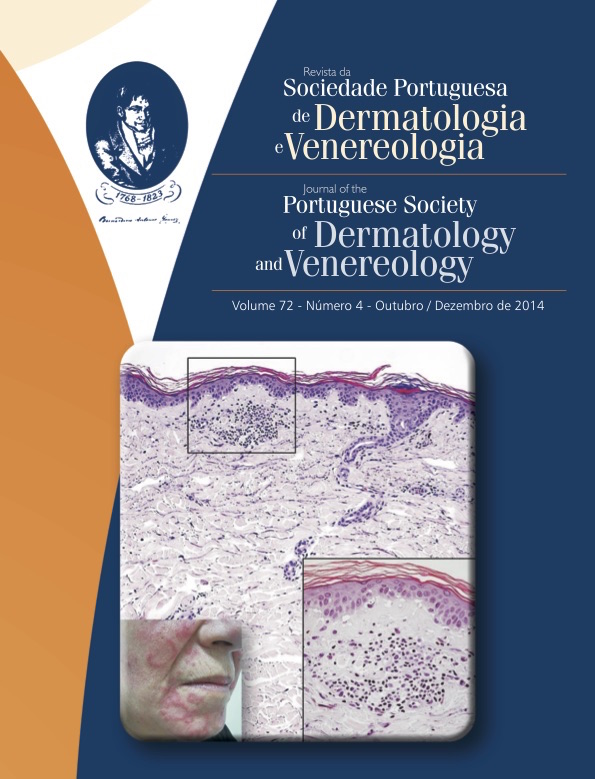ECCRINE DUCTAL CARCINOMA
Abstract
Ductal eccrine carcinoma is a rare and aggressive skin cancer. Its diagnosis implies the exclusion of a primary adenocarcinoma located elsewhere with cutaneous metastization, as the histological and immunohistochemical analysis are not sufficient by themselves. We report the clinical case of a 75-year-old male with a 3 cm width tumor located on the right hemiface, which was excised and whose histology and immunohistochemistry pointed towards an eccrine ductal carcinoma. The complementary investigation showed multiple pleural and pulmonary nodules, as well as neoplastic involvement of the dorsal and lumbar vertebral column. Their histological and immnunohistochemical examination, supplement with the absence of imagiologic findings suggesting a primary tumor in another location, allowed the diagnosis of a metastatic eccrine ductal carcinoma. The patient died 6 months after the initial consultation.
Downloads
References
Wick MR, Goellner JR, Wolfe JT 3rd, Su WP. Adnexal carcinomas of the skin. I. Eccrine carcinomas. Cancer.
; 56(5):1147-62.
Kacker A, Shaha AR. Ductal eccrine carcinoma arising in the postaural area. Ear Nose Throat J. 1999; 78(8):576-7.
Urso C, Bondi R, Paglierani M, Salvadori A, Anichini C, Giannini A. Carcinomas of sweat glands: report of 60 cases. Arch Pathol Lab Med. 2001; 125(4):498-505.
Park BW, Kim SI, Lee KS, Yang WI. Ductal eccrine carcinoma presenting as a Paget's disease-like lesion of the breast. Breast J. 2001; 7(5):358-62.
Krishnakumar S, Mohan ER, Babu K, Das D, Biswas J. Eccrine duct carcinoma of the eyelid mimicking meibomian carcinoma: clinicopathological study of a case. Surv Ophthalmol. 2003; 48(4):439-46.
McLean SR, Shousha S, Francis N, Lim A, Eccles S, Nathan M, et al. Metastatic ductal eccrine adenocarcinoma
masquerading as an invasive ductal carcinoma of the male breast. J Cutan Pathol 2007;34(12):934-8.
Tumors of the sweat glands. In: Calonje E, Brenn T, Lazar AJ, McKee PH, editors. McKees’s Pathology of the Skin. 4th edition. Philadelphia: Saunders; 2012. p.1569-1570.
Urso C, Paglierani M, Bondi R. Histologic spectrum of carcinomas with eccrine ductal differentiation (sweat-gland ductal carcinomas). Am J Dermatopathol. 1993; 15(5):435-40.
Wick MR, Ockner DM, Mills SE, Ritter JH, Swanson PE. Homologous carcinomas of the breasts, skin, and salivary glands. A histologic and immunohistochemical comparison of ductal mammary carcinoma, ductal sweat gland carcinoma, and salivary duct carcinoma. Am J Clin Pathol. 1998; 109(1):75-84.
Swanson PE, Mazoujian G, Mills SE, Campbell RJ, Wick MR. Immunoreactivity for estrogen receptor protein in sweat gland tumors. Am J Surg Pathol. 1991; 15(9):835-41.
Rollins-Raval M, Chivukula M, Tseng GC, Jukic D, Dabbs DJ. An immunohistochemical panel to differentiate
metastatic breast carcinoma to skin from primary sweat gland carcinomas with a review of the literature. Arch Pathol Lab Med. 2011; 135(8):975-83.
Busam KJ, Tan LK, Granter SR, Kohler S, Junkins-Hopkins J, Berwick M, et al. Epidermal growth factor, estrogen, and progesterone receptor expression in primary sweat gland carcinomas and primary and metastatic mammary carcinomas. Mod Pathol. 1999; 12(8):786-93.
Montezuma D, Azevedo R, Lopes P, Vieira R, Cunha AL, Henrique R. A panel of four immunohistochemical markers (CK7, CK20, TTF-1, and p63) allows accurate diagnosis of primary and metastatic lung carcinoma on biopsy specimens. Virchows Arch. 2013;463(6):749-54.
All articles in this journal are Open Access under the Creative Commons Attribution-NonCommercial 4.0 International License (CC BY-NC 4.0).








